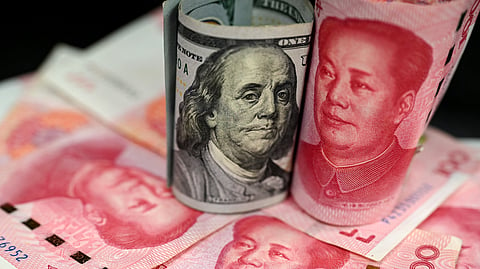

China has raised retaliatory tariffs to 84 per cent on all goods coming from the US, in an additional countermeasure to President Donald Trump's tariffs of 104 per cent on Chinese exports.
"Additional tariff rates... will rise from 34 percent to 84 percent", effective from 12:01 pm on Thursday, the Chinese finance ministry said in a statement.
Last week, China had said it would levy 34 per cent tariffs on all US goods.
"The tariff escalation against China by the United States simply piles mistakes on top of mistakes (and) severely infringes on China's legitimate rights and interests," the ministry said.
Washington's moves "severely damage the multilateral rules-based trade system", it added.
In a separate statement, Beijing's commerce ministry said it would blacklist six American artificial intelligence firms, including Shield AI and Sierra Nevada Corp.
Trump did not immediately react to the Chinese counterattack but he called on companies to start relocating to the United States to avoid tariffs.
"This is a GREAT time to move your COMPANY into the United States of America, like Apple, and so many others, in record numbers, are doing," the US president said on his Truth Social platform.
He urged: "DON'T WAIT, DO IT NOW!"
China vowed on Wednesday to take “firm and forceful” measures to protect its interests after Trump’s steep 104% tariffs took effect, as global markets came under pressure.
China -- Washington's top economic rival but also a major trading partner -- is the hardest hit, with tariffs imposed on its products since Trump returned to the White House now reaching a staggering 104 percent.
In response, Beijing's foreign ministry spokesman Lin Jian insisted that "the Chinese people's legitimate right to development is inalienable... China's sovereignty, security and development interests are inviolable."
"We will continue to take firm and forceful measures to safeguard our legitimate rights and interests," he added.
Meanwhile, a white paper shared by chinese state media Xinhua on Wednesday said that Beijing and Washington can resolve trade and economic disputes through "equal" dialogue.
"China and the United States can resolve differences in economic and trade areas through equal-footed dialogue and mutually beneficial cooperation," the white paper said.
Similarly, Xinhua reported that Beijing’s commerce ministry stated the country had a “firm will” to fight a trade war with Washington.
"With firm will and abundant means, China will resolutely take countermeasures and fight till the end if the United States insists on further escalating economic and trade restrictive measures," Xinhua quoted the ministry as saying.
A day earlier, China said it will "fight to the end" and warned of countermeasures after Trump threatened to raise his tariffs even further on the world's second-largest economy.
Following the sweeping 10 percent tariffs imposed over the weekend, rates on imports to the United States from exporters including the European Union and Japan rose further on Wednesday.
The customized rates for nearly 60 economies supersede baseline duties that took effect on Saturday. New levels largely range from 11 percent to 50 percent, but retaliation from Beijing will see the US tariffs imposed on China this year rise to a staggering 104 percent.
World shares deepen losses
Asian and European shares slid on Wednesday, with Japan's Nikkei 225 closing almost 4% lower after launch of the latest set of US tariffs, including a massive 104% levy on Chinese imports took effect.
Chinese markets advanced after regulators appeared to intervene, urging state-owned companies to buy shares.
Germany's DAX lost 2.1% to 19,857.36. In Paris, the CAC 40 declined 2.1% to 6,949.92. Britain's FTSE 100 gave up 2% to 7,753.42.
The future for the S&P 500 lost 0.7% while that for the Dow Jones Industrial Average was down 0.5%.
Markets have been wobbly for days, with investors flummoxed over what to make of President Donald Trump's trade war.
On Tuesday, the S&P 500 dropped 1.6% after wiping out an early gain of 4.1%. That took it nearly 19% below its record set in February. Similarly, The Dow Jones Industrial Average dropped 0.8%, while the Nasdaq composite lost 2.1%.
Stocks had rallied globally on Tuesday, with indexes up 6% in Tokyo, 2.5% in Paris and 1.6% in Shanghai. Any optimism or buying enthusiasm appeared to have dissipated by the time the sharply higher tariffs became reality. The Nikkei 225 fell 3.9% to 31,714.03.
In Hong Kong, the Hang Seng rose 0.4% to 20,205.04, while the Shanghai Composite index reversed early losses, gaining 1.3%. to 3,186.81.
Taiwan led losses in Asia, as its Taiex plunged 5.8%. Big tech manufacturers were among the biggest decliners. Computer chip giant TSMC Corp. dropped 3.8% while iPhone maker Hon Hai Precision Industry plunged 10%.
South Korea's Kospi lost 1.7% to 2,293.70, and the government said it would provide help for its beleaguered automakers.
The S&P/ASX 200 in Australia declined 1.8% to 7,375.00. Shares in New Zealand also fell.
In India, the Sensex declined 0.5% as the central bank cut its benchmark interest rate, while Bangkok's SET shed 0.8%.
Analysts have been warning to expect more swings up and down in markets given the uncertainty over how long Trump will keep the stiff tariffs on imports, which will raise prices for US shoppers and slow the economy. If they last a long time, economists and investors expect them to cause a recession. If Trump lowers them through negotiations relatively quickly, the worst-case scenario might be avoided.
Hope still remains on Wall Street that negotiations may be possible, which helped drive the morning's rally. Trump said Tuesday that a conversation with South Korea's acting president helped them reach the "confines and probability of a great DEAL for both countries."
(With inputs from AP and AFP)